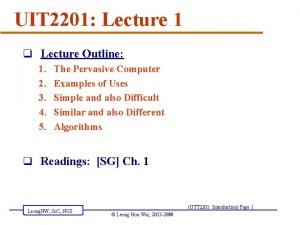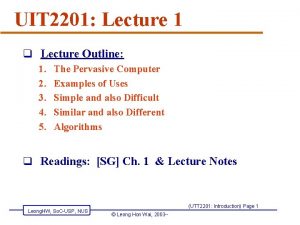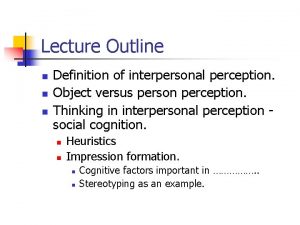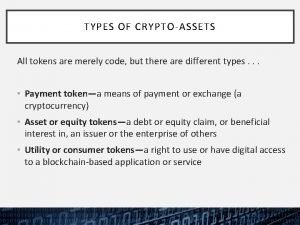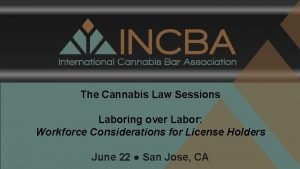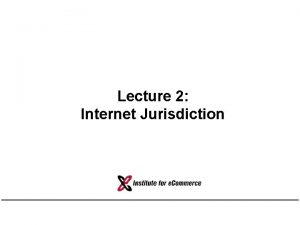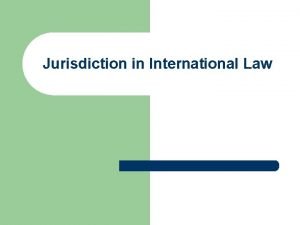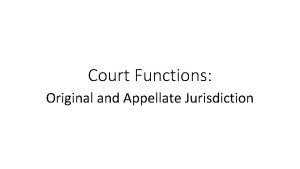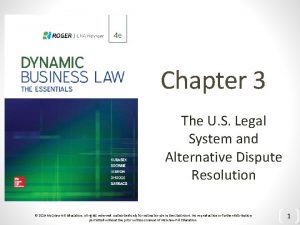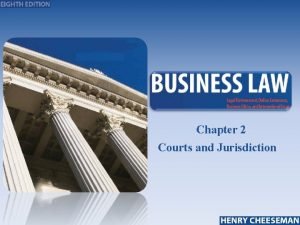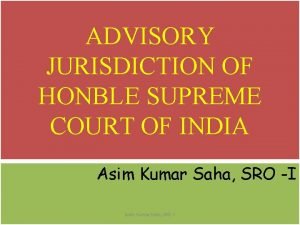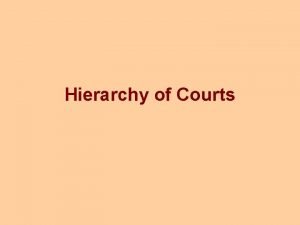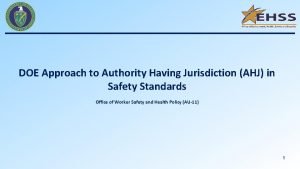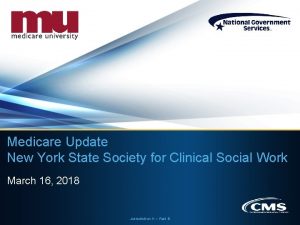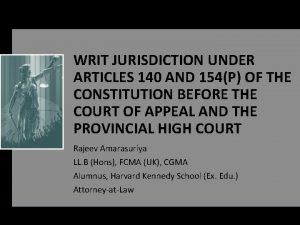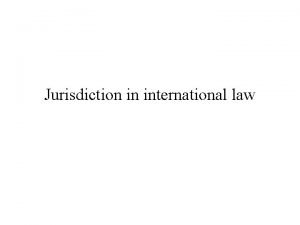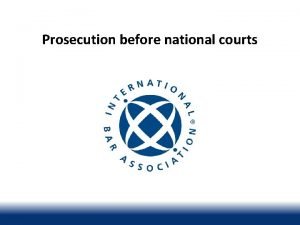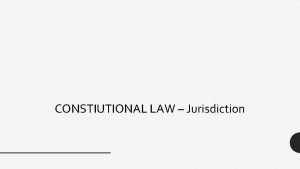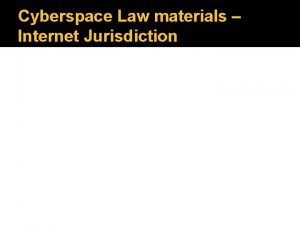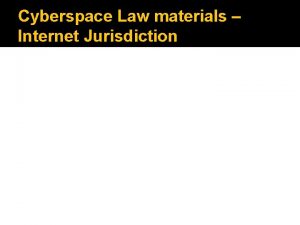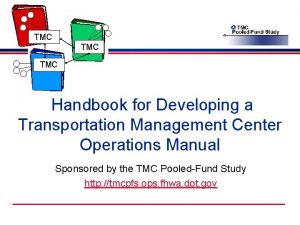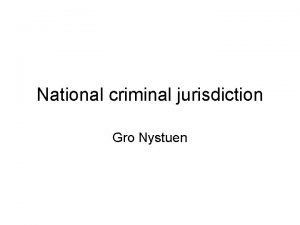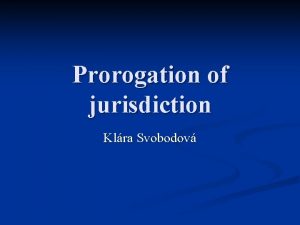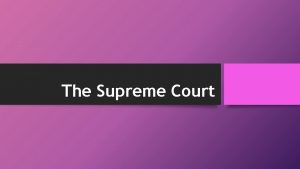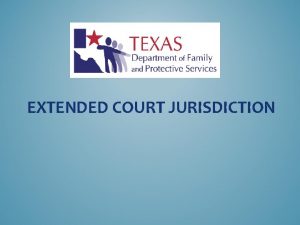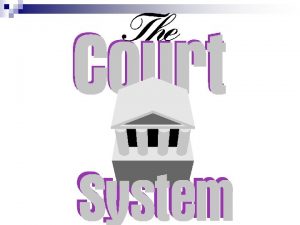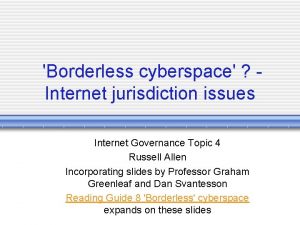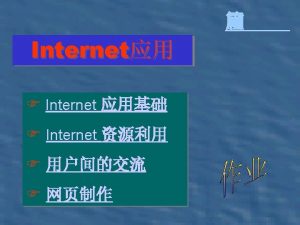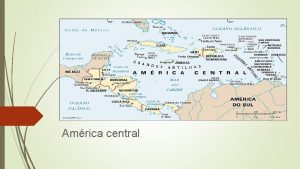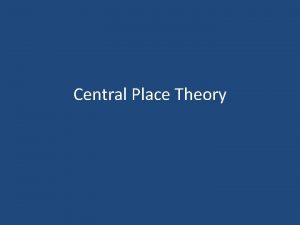Lecture 2 Internet Jurisdiction Outline Jurisdiction the central

































- Slides: 33

Lecture 2: Internet Jurisdiction

Outline • Jurisdiction: the central Internet legal question – Why? Every website is accessible from everywhere • Personal jurisdiction in the US • Internet jurisdictional tests • International jurisdiction

Internet Operation www. tektronix. com 192. 65. 40. 31 PC SERVER ROUTER REQUEST FOR HOME PAGE www. cs. cmu. edu 128. 2. 203. 179 ADDRESSEE: 192. 65. 40. 31 PC ROUTER HOME PAGE ADDRESSEE: 128. 2. 203. 179 SERVER

Internet Communications www. tektronix. com www. cs. cmu. edu SEATTLE BEAVERTON CHICAGO MIDDLETOWN PHILADELPHIA DC

Personal Jurisdiction • When does court C have power over person X? – Example: Can a resident of Pennsylvania be sued in California for breach of an online contract? – Who decides? The court decides on its own jurisdiction. • Personal jurisdiction is largely geographic – Acts, parties, physical presence in a state – Long-arm power. States have jurisdiction over people outside the state causing harm inside the state • The Internet does not respect geography – Often can’t tell where someone is – Can’t tell routing, location of caches, optical cables, servers, etc. – Does it matter?

Personal Jurisdiction • Constitutional limitations – 5 th Amendment: “No person shall be “deprived of life, liberty, or property, without due process of law. ” (Applies to federal government) – 14 th Amendment: “nor shall any State deprive any person of life, liberty, or property, without due process of law. ” • What is a “person”? – A natural person – A “juristic person. ” A partnership, corporation, limited liability company, trust, etc. An entity that can sue and be sued.

Due Process • What is “due process”? – ‘due process’ means fundamental fairness and substantial justice. Vaughn v. State, 3 Tenn. Crim. App. 54, 456 S. W. 2 d 879, 883 (1970) – "An orderly proceeding wherein a person is served with notice, … and has an opportunity to be heard and to enforce and protect his rights before a court having power to hear and determine the case. Kazubowski v. Kazubowski, 45 Ill. 2 d 405, 259, N. E. 2 d 282, 290 (1970), cert. den. 400 U. S. 926

Personal Jurisdiction (U. S. ) • Residents of a state are subject to its jurisdiction – Based on geography, state manages its territory • Avail themselves of the legal protection of the state • Juristic persons reside in any state in which they (1) are incorporated; or (2) “doing business”; or (3) where their employees reside • Residents can be sued in their own state on any type of claim for which the court has subject matter jurisdiction. (Personal jurisdiction not an issue. )

Personal Jurisdiction (U. S. ) • Federal courts: jurisdiction specified by law – Federal matters: “all cases arising under the Constitution, laws, or treaties of the United States” 28 U. S. C. § 1331 – State matters: 28 U. S. C. § 1332. Amount over $75 K and • between citizens of different states • between a foreign state (country) and a U. S. citizen • States: – for residents (citizens + people within the state’s borders): unlimited jurisdiction – for non-residents: jurisdiction limited by the Constitutional guarantee of “due process”

Jurisdiction Over Non-Residents • Based on actions of the party • “Minimum contacts” rule: does the party have sufficient “contacts” with the forum that exercising jurisdiction will not “offend traditional notions of fair play and substantial justice”? International Shoe Co. v. Washington, 326 U. S. 310 (1945) • Foreseeability: Would the party expect to be sued there? • Forum = place where the case is being heard

Jurisdiction Over Non-Residents • Did the party “purposefully avail himself” of the privilege of conducting activities in the forum? • “Purposefully directing” activities to the forum • Transacting business with the forum • Visiting the forum in connection with the transaction • Acts with consequences in the forum, e. g. causing injury • Contacts “numerous, purposeful, and continuous” • Not “random, isolated, or fortuitous”

Example: Pennsylvania Long-Arm Statute • A Pa. Court may exercise jurisdiction over a person who acts directly or by an agent, as to a cause of action arising from: • Transacting any business in this Commonwealth: – doing by any person in this Commonwealth of a series of similar acts for the purpose of realizing pecuniary benefit – doing of a single act in this Commonwealth for the purpose of thereby realizing pecuniary benefit with the intention of initiating a series of such acts. – shipping merchandise directly or indirectly into or through Pa. – engaging in any business or profession within Pa. • Contracting to supply services or things in Pa. • Causing harm or tortious injury by act or omission in or out of Pa. 42 Pa. C. S. § 5322

Factors Affecting Jurisdiction When more than one state has jurisdiction, we look at: (1) burden on the defendant (2) forum state's interest in resolving the dispute (3) the plaintiff's interest in receiving convenient and effective relief (4) interstate judicial system's interest in obtaining the most efficient resolution of controversies, and (5) shared interest of the several states in furthering fundamental substantive social policies. Burger King Corp. v. Rudzewicz, 471 U. S. 462, 472 (1985)

Internet Jurisdiction NOT JUST JURISDICTION OVER WEB TRANSACTIONS • Maintaining website that regularly sends information into the forum state on request is sufficient for general jurisdiction. – Maritz, Inc. v. Cyber. Gold, Inc. , 947 F. Supp. 1328 (E. D. Mo. 1996). Full text. – Cyber. Gold had a website in California that sent advertisements to interested users who signed up to receive them – Cyber. Gold had no employees or physical presence in Missouri – Maritz, a Missouri corporation, alleged trademark infringement – Held: Missouri jurisdiction proper. “Cyber. Gold automatically and indiscriminately responds to each and every user who accesses its web site”

Internet Jurisdiction Issues • Where does an Internet company reside? – – – – – Where any of its servers is located? Where the domain is registered? Along the path where messages are routed to it? Where more than 3 employees work? Where its ISP is located? Where a lot of computers are located? Where orders are “taken”? Where orders are “filled”? Where goods are stored? What about information goods? • Do any of these distinctions make sense? • Do we need Internet courts?

Internet Jurisdiction • Courts recognize three types of e. Commerce activity • Doing business over the Internet – “the knowing and repeated transmission of computer files over the Internet” – Personal jurisdiction proper • Passively informational websites – “little more than an electronic billboard for the posting of information” – No personal jurisdiction • Gray area: – defendant has a website that allows a user to exchange information with a host computer – jurisdiction depends on nature of the information transmitted and degree of interaction.

Zippo Case • Zippo Manufacturing v. Zippo Dot Com Inc. , 952 F. Supp. 1119 (W. D. Pa. 1997), 2 ECLR 197, 2/14/97. Full text. • Zippo Manufacturing is in Bradford, Pa. Makes Zippo lighters • Zippo. com is in Sunnyvale, California. Operates an Internet news service. 140, 000 subscribers. About 3000 (2%) are in Pa. Subscribers only have password access to a bulletin board • Zippo. com has contracts with 7 ISPs in Pa. • Zippo Manufacturing sued Zippo. com for trademark infringement • HELD, jurisdiction proper because of Pa. contacts – “The middle ground is occupied by interactive Web sites where a user can exchange information with the host computer. In these cases, the exercise of jurisdiction is determined by examining the level of interactivity and commercial nature of the exchange of information that occurs on the Web site. ”

Intercon Case • Intercon, Inc. v. Bell Atlantic Internet Solutions, Inc. , 205 F. 3 d 1244 (10 th Cir. , March 9, 2000). Full text. • Intercon is an Oklahoma ISP (icon. net) • Bell Atlantic Internet Solutions is a Delaware corp. offering dialup ISP service in the northeast US. No presence in Oklahoma • Bell Atlantic mistakenly routed its email traffic to icon. net instead of to its subcontractor iconnet. net • icon. net was choked with email, severely affecting its ISP service. Took 7 months for Bell Atlantic to correct the problem • Intercon sued Bell Atlantic in Oklahoma • HELD, jurisdiction proper because “defendant purposefully availed itself of the Oklahoma server for … months after being notified of the erroneous address” • (District Court dismissed the case; Court of Appeals reversed. )

Effect of Forum Selection Clauses • Williams v. America On. Line, Inc. , (2001 Mass. Super. No. 000962) • Software downloaded by AOL damaged Williams’ computer • Williams consented to an online “Terms of Service” contract containing the clause: “You expressly agree that exclusive jurisdiction for any claim or dispute with AOL or relating in any way to your membership or your use of AOL resides in the court of Virginia and you further agree and expressly consent to the exercise of personal jurisdiction in the courts of Virginia in connection with any such dispute. …” • Williams was already an AOL member; previously agreed to a Virginia forum selection clause • Damage to computer occurred before Williams agreed to new contract. New contract governs, but forum selection clause is unenforceable!

Butler v. Beer Across America • • Beer Across America (BAA): Illinois company selling beer over the Internet; no offices, assets or personnel in Alabama; never visited Alabama Butler and her son, a minor, live in Alabama. Son bought 12 bottles of beer for $24. 95 from BAA by ordering over the Internet The Alabama Civil Damages Act provides for a civil action by the parent or guardian of a minor against “any person who unlawfully sells or furnishes spiritous liquors to such minor and may recover such damages as the jury may assess. ” Butler brought suit against BAA in Alabama. (Why? ) BAA had sold beer to other Alabama residents, bought beer from Alabama brewers. Advertised nationally, but not specifically in Alabama HELD: no personal jurisdiction over BAA in Alabama. Website “electronic version of a postal reply card” Butler is not without remedy. Case was transferred to court in Illinois. Butler v. Beer Across America, 83 F. Supp. 2 d 1261 (N. D. Ala. 2000)

Internet Criminal Jurisdiction • Transmission of obscene material from California over phone lines to Tennessee computer sufficient contact to try California residents in Tennessee, even though transmission was originated by postal inspector from Tennessee – United States v. Thomas, 74 F. 3 d 701 (6 th Cir. 1996) cert. den. Full text.

Bases of International Jurisdiction • Territoriality principle – regulate conduct within its territory • Nationality principle – regulate conduct of nationals, wherever they are • Effects principle – regulate conduct having effect in the state • Universality principle – jurisdiction over crimes that are universally condemned • Protective principle – jurisdiction over defendants who threaten security of a state

The i. Crave. TV Case CANADA • US TV stations broadcast from Buffalo • i. Crave. TV is a Canadian company owned Pennsylvania residents Real. Server • i. Crave. TV registered the i. Crave. TV. com domain name in Pittsburgh i. Crave. TV NY TORONTO • • i. Crave. TV set up receivers in Toronto, Canada • Received US TV signals, stored them on a streaming Real. Server in Canada BUFFALO • • i. Crave. TV wrapped it own advertising around the images and served them to anyone visiting its website PA PITTSBURGH i. Crave. TV. com • UNITED STATES • No i. Crave. TV servers in the US • i. Crave. TV was sued in Federal Court in Pittsburgh by TV networks, movie studios and sports leagues for copyright infringement • Do US courts have jurisdiction?

Soma v. Standard Chartered Bank • Soma Medical International v. Standard Chartered Bank, 196 F. 3 d 1292 (10 th Cir. 1999). Full text. • Soma is a Delaware corporation doing business in Utah • Standard Chartered Bank (SCB) is a UK bank with an office in Hong Kong (no presence in Utah) • Soma had an account with SCB’s Hong Kong office • SCB maintained a website accessible from Utah • Defendant Fong submitted a forged signature card to SCB; then withdrew $250, 000 from Soma’s account • Soma sued SCB in Utah • HELD, no jurisdiction in Utah since SCB had a “passive Web site that does little more than make information available to those who are interested”

Yahoo! Nazi Memorabilia Case • The Penal Code of France, Sec. R 6456, makes it an offense – “other than for the needs of a film; a show or an exhibit enjoying historical context, – to wear or exhibit in public a uniform, an insignia or an emblem which evokes the uniforms, insignia or the emblems which were worn or exhibited [by Nazis]” • Penalty: – fines; higher for subsequent offenses – confiscation of the object used to commit the infraction – perform public service; prohibition against carrying firearms for 3 years • Yahoo! auctions routinely offered Nazi items • Yahoo! Inc. is a California corporation • Yahoo! France is a joint venture between Yahoo! Inc. and Softbank, a UK corporation

Yahoo! Nazi Memorabilia Case • Yahoo! Inc. and Yahoo France were sued in France by LICRA (League Against Racism and Antisemitism) and UEJF (Union of French Jewish Students) to enforce R 6456 • Yahoo argued: – Court had no jurisdiction over it – Yahoo’s content is directed to US “internauts” – Yahoo servers are in the US – Any order against Yahoo could not be enforced in the US because of freedom of speech • HELD, France has jurisdiction over Yahoo because – violation of the Code was disruptive to public order – visualization of Nazi objects causes grief in France – Yahoo (US) offers French content to users in France

March 11, 2001

Yahoo! Nazi Memorabilia Case • Yahoo! initially complied with the French order • Dec. 2000 Yahoo filed a declaratory judgment action in California against LICRA and UEJF – asserts jurisdiction on grounds that: • LICRA, UEJF sent cease-and-desist letters into California • LICRA, UEJF agreed to Yahoo’s “terms of service” • LICRA, UEJF used the U. S. Marshal to serve process – alleges: • Yahoo cannot comply on technological grounds • French order chills freedom of expression in the U. S. • Online service providers are immunized by DMCA • Feb. 2001 Yahoo announced it would no longer comply SUCCEEDED

Yahoo! Nazi Memorabilia Case • Nov. 2001 California court granted summary judgment that “the First Amendment precludes enforcement within the United States of a French order intended to regulate the content of its speech over the Internet. ” 169 F. Supp. 2 d 1181 (N. D. Cal. 2001) • “What issue here is whether it is consistent with the Constitution and laws of the United States for another nation to regulate speech by a United States resident within the United States on the basis that such speech can be accessed by Internet users in that nation. ” • Dec. 2001: appeal filed with Ninth Circuit

Significance of Yahoo! • Goes way beyond Nazi memorabilia • Basic question: When acts performed in country A are legal in A but violate the laws of B because of transmission over the Internet: – Whose laws apply? – Does B have jurisdiction? – Should A act in aid of any judgment against its own citizen?

In the Matter of Moshe D. • Court of Cassation, Rome, Italy (Dec. 27. 2000) • Moshe D. was libeled by a statement on a website outside Italy • Magistrate forbade prosecution: (1) offense not committed in Italy; (2) sequestration of the server would affect other sites • Reversed on appeal. Prosecution may proceed. • Court must “assess the nature of the offense of libel as perpetrated through that new medium of … the Internet” • “The offense is … perpetrated not upon publication of the injurious statement, but when the same is perceived by subjects one may consider “third parties” in relation to both the sender and the injured party” • Conclusion: libel is an offense anywhere the statement is perceived

Major Ideas • • • Jurisdiction is largely territorial Territories make little sense on the Internet Jurisdiction should be predictable, but isn’t Federal action may be necessary International jurisdiction is complicated by the interaction of different legal systems • An Internet treaty may be required

Q&A 46 -840 ECOMMERCE LAW AND REGULATION SPRING 2002 COPYRIGHT © 2002 MICHAEL I. SHAMOS
 01:640:244 lecture notes - lecture 15: plat, idah, farad
01:640:244 lecture notes - lecture 15: plat, idah, farad Lecture outline example
Lecture outline example Lecture outline example
Lecture outline example Lecture outline example
Lecture outline example Lecture outline meaning
Lecture outline meaning Federal reserve jurisdiction
Federal reserve jurisdiction Ice jurisdiction
Ice jurisdiction Federal question jurisdiction
Federal question jurisdiction Three types of jurisdiction
Three types of jurisdiction Types of jurisdiction
Types of jurisdiction What is original jurisdiction
What is original jurisdiction Jurisdiction vs venue
Jurisdiction vs venue Jurisdiction vs venue
Jurisdiction vs venue Court jurisdiction types
Court jurisdiction types Jurisdiction cacodaemonic
Jurisdiction cacodaemonic Jurisdiction of high court
Jurisdiction of high court Authorities having jurisdiction
Authorities having jurisdiction Medicare jurisdiction k
Medicare jurisdiction k Writ jurisdiction in sri lanka
Writ jurisdiction in sri lanka Module
Module Why jurisdiction is important
Why jurisdiction is important Commodity jurisdiction final determinations
Commodity jurisdiction final determinations Universal jurisdiction
Universal jurisdiction California coastal commission map
California coastal commission map The quote sandwich example
The quote sandwich example What is internet
What is internet Hát kết hợp bộ gõ cơ thể
Hát kết hợp bộ gõ cơ thể Lp html
Lp html Bổ thể
Bổ thể Tỉ lệ cơ thể trẻ em
Tỉ lệ cơ thể trẻ em Chó sói
Chó sói Tư thế worm breton là gì
Tư thế worm breton là gì Chúa yêu trần thế alleluia
Chúa yêu trần thế alleluia Môn thể thao bắt đầu bằng chữ f
Môn thể thao bắt đầu bằng chữ f


